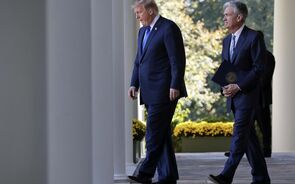The next American Empire
2 mensagens
|Página 1 de 1
"...this is a good time to review America's place(s) in the world, because the rationale for doing it is widely understood. But, because of Iraq, this may be the worst, as well as the best of times, to redesign the American empire."
ECONOMIST
No Título do Livro "DEMOCRACIA e SECRETISMO" do
DR.OSWALD LE WINTER da Publicações EUROPA-AMÈRICA.
Diz-nos:
AVISO
Este livro contém uma quantidade enorme de informações provocadoras. Se está dependente da visão do mundo que tem actualmente, não continue a ler. Se sente que não pode suportar emocionalmente o que está a acontecer na realidade neste mundo, não continue a ler. Porém, se decidir continua tenha a certeza de que não há nada a temer. A liberdade depende do conhecimento. O secretismo é inimigo do conhecimento e, portanto, o inimigo da liberdade.
O Autor
DR. OSWALD LE WINTER
DEMOCRACIA e SECRETISMO
Alguém já o leu??
comentários.
obrigado
ECONOMIST
No Título do Livro "DEMOCRACIA e SECRETISMO" do
DR.OSWALD LE WINTER da Publicações EUROPA-AMÈRICA.
Diz-nos:
AVISO
Este livro contém uma quantidade enorme de informações provocadoras. Se está dependente da visão do mundo que tem actualmente, não continue a ler. Se sente que não pode suportar emocionalmente o que está a acontecer na realidade neste mundo, não continue a ler. Porém, se decidir continua tenha a certeza de que não há nada a temer. A liberdade depende do conhecimento. O secretismo é inimigo do conhecimento e, portanto, o inimigo da liberdade.
O Autor
DR. OSWALD LE WINTER
DEMOCRACIA e SECRETISMO
Alguém já o leu??
comentários.
obrigado
-
Visitante
The next American Empire

Military strategy
The next American empire
Mar 18th 2004 | WASHINGTON, DC
From The Economist print edition
George Bush and Donald Rumsfeld have pledged to change the way America's armed forces are distributed around the globe. What do they have in mind?
WHEN the second world war and the Korean war had ended, America found itself in possession of what turned out to be some pretty useful territory. The bases used in the Japanese, European and Korean campaigns proved vital in the prosecution of the cold war. During it, the disposition of America's forces petrified, and large concentrations are still in Germany, South Korea and Japan. Now, as George Bush announced at the end of last year, that pattern is being re-thought, in advance of what Donald Rumsfeld, his defence secretary, grandiosely describes as the biggest restructuring of America's global forces since 1945. The outcome will intimate not only America's perception of the threats it faces in the new century, but also its attitude towards friends and alliances.
Three main factors are driving the review. The first is the emergence of new and unpredictable dangers—one of them manifest in Madrid last week. The Pentagon still worries about China and North Korea; about an India-Pakistan conflagration; and about the security of the Gulf. But alongside these concerns are the unknown unknowns of international terrorism, and an arc of post-cold-war instability that stretches from the Balkans to the Caucasus and around the Asian shore.
In the kinds of operations that these new threats may entail, American troops are less likely to have to “fight in place” on the plains of Germany than to get to remote regions quickly. And such wars and skirmishes may turn out to be as controversial as the ousting of Saddam Hussein. This means that America will need to rely on new allies in hitherto neglected regions, and avoid depending on bases in countries that might prove squeamish about pre-emption or prevention. Douglas Feith, a Pentagon official who is helping to conduct the review, says that there is no point having forces in places from which they can't be moved to the fight. The pre-Iraq international rancour is bound to inform such calculations, however much it is now said to be ancient history.
As these new threats have emerged, others have changed or receded—most obviously, Mr Hussein himself. His demise has already led to the withdrawal of most American forces from Saudi Arabia (an “occupation” famously anathema to Osama bin Laden), and the shifting of an air HQ from there to Qatar.
Then there is Kim Jong Il. The hollowing of North Korea's armed forces, and the growing competence and confidence of South Korea's, mean that the South could defend itself much better than in the past against a conventional attack from the north. Plans have already been announced for the South to take over more responsibility from the Americans up near the demilitarised zone. Some in America, who worry that paternalism risks emasculating their country's allies (as well as needlessly consuming American resources), have long advocated such a handover. So some American assets will be moved down the peninsula, where they may be more use for other contingencies, as well as for a counter-attack in the event of an invasion. The main base outside Seoul—a source of friction with the locals, as are the cluster of marine bases on the claustrophobic Japanese island of Okinawa—will move too.
The second important factor is technology. Jobs such as surveillance and reconnaissance can increasingly be done from America itself (and from space). The lighter ground forces that America's army is hoping to field soon should be more easily deployable than today's tanks. The air force can do ever more damage with ever fewer planes. Enemy technology is also a consideration: adversaries may in future be more able and willing to attack American bases in volatile places with missiles and WMD, making those bases more vulnerable and more expensive to maintain.
Given this technological progress, one Pentagon mantra is that its involvement in a region should no longer be measured by the number of boots, tanks and aeroplanes that it has on the ground, but on its “capabilities”—ie, the force that it can bring to bear. That is just as well, since those boots are in short supply and high demand, another of the considerations that will help to shape the global review.
America's active-duty force shrunk by around a third during the 1990s—it now numbers around 1.4m altogether—even as the eruption of small, hot wars made it busier. Now the labour-intensive task of pacifying Iraq is straining America's army almost to breaking point. Before September 11th there was talk of further manpower cuts; many in Congress now want a statutory increase in the army's size. They argue that, as things stand, army recruitment and retention will suffer, especially after units who have already fought in Iraq are sent back.
Mr Rumsfeld is resisting these calls: his budget is coming under pressure; people are expensive and getting more so; and he would prefer to avoid a statutory force increase that would compromise the funds available for the modernisation (or “transformation”) to which he is devoted. (Mr Rumsfeld's unconvincing answer to the Iraq problem is a temporary troop increase, under emergency powers, plus internal army restructuring.) But his global review will need to take account of these strains, as well as those induced by the ongoing deployments in Korea, the Balkans and Afghanistan.
Much ado about what?
In theory, the first two factors—new threats and technology—suggest a revised global “posture” in which, while retaining some large “hubs”, America also develops smaller, dispersed bases in previously unconsidered regions, as it did in central Asia at the time of the Afghan war. Some of these could be lightly manned or even manless when not in use, and rapidly reinforced by air and sea in times of crisis. Andrew Krepinevich, of the Centre for Strategic and Budgetary Assessments, compares the frontier posts of the Roman empire, which could be (relatively) speedily reinforced by road (see Mr Krepinevich's maps below). Paul Wolfowitz, the deputy defence secretary, also talked recently about the importance, in the disparate “war on terror”, of working with indigenous forces—as America did in Afghanistan, and as Britain regularly did when its own empire sprawled across the globe.
To be specific, Mr Rumsfeld has said there will be changes to the American presence in Japan—home to around 40,000 servicemen—and in South Korea and Germany (though the status of Ramstein air base there seems assured). Although he has also said that he doesn't plan many new bases, there are likely to be new facilities in the countries of his “new Europe”, which are closer to the Balkans and to central Asia than is “old Europe”.
Elsewhere, more Americans may wind up in Africa, and some of the Okinawa marines could conceivably be sent to northern Australia, where they will consolidate one of America's most durable alliances. New naval arrangements in Asia are also being considered. Bosnia will eventually be left to the Europeans. In time, the Pentagon may develop the futuristic concept of offshore bases, loosely based on oil platforms, which might help to circumvent diplomatic and “access” problems, though only up to a point. Meanwhile, more stocks may be pre-positioned in strategic places, and more servicemen—happily for them—will be based back in America.
What might the diplomatic consequences of such a re-jig be? Russia seems prepared to swallow an American presence in Bulgaria and Romania, which are keen on the jobs and extra security that hosting the Americans would bring (though the Russians would like to draw the line at the Baltics). Moving many of the 70,000-odd personnel and around 80,000 dependants based in Germany either east, or west across the Atlantic, will cost Germany jobs and, in the long term, might weaken an old alliance. Military co-operation acts as a ballast when diplomatic relations fray; less of it increases the chances of drift. Yet some newer allies might be less than thrilled with the idea of hosting empty or near-empty bases. As John Hamre, a former deputy secretary of defence, puts it, such countries might ask: “If it isn't a permanent commitment of troops, is it a permanent commitment to our security?”
None of these decisions will be finalised until after an equally sensitive round of base closures in America itself is completed. But if the third important factor—the strain on the force—hasn't receded, the restructuring may turn out to be humbler than Mr Rumsfeld would like. Troops in Germany live in western comfort and with their families. Michael O'Hanlon of the Brookings Institution points out that shifting people to less salubrious bases in eastern Europe or elsewhere would increase the burden on an overstretched force, since those troops would have to be rotated back to America after their tours, with other units taking their place.
Mr Feith says this is a good time to review America's place(s) in the world, because the rationale for doing it is widely understood. But, because of Iraq, this may be the worst, as well as the best of times, to redesign the American empire.
Fonte: The Economist
Um abraço,
MozHawk
2 mensagens
|Página 1 de 1
Quem está ligado:
Utilizadores a ver este Fórum: ASimoes, Bar38, cftomas, Google [Bot], icemetal, iniciado1, latbal, m-m, malakas, maturidade, nunorpsilva, O Magriço, Olhar Leonino, Pmart 1, Purificaçao e 73 visitantes


